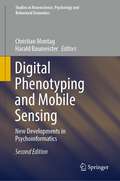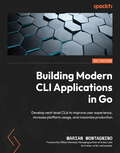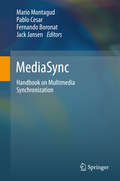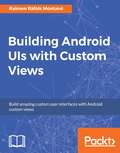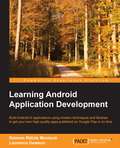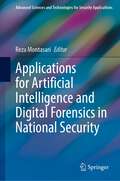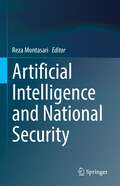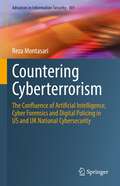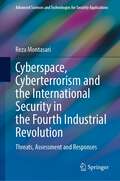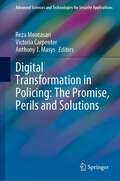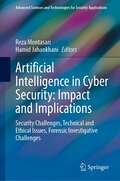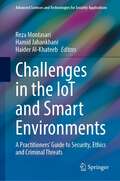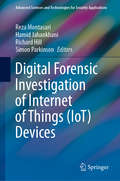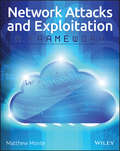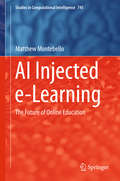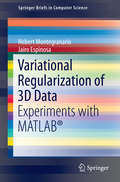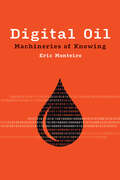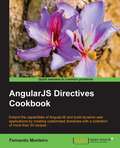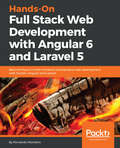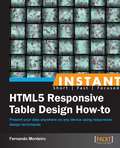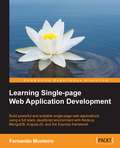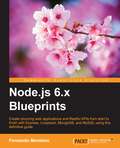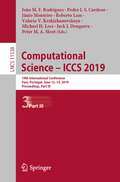- Table View
- List View
Digital Phenotyping and Mobile Sensing: New Developments in Psychoinformatics (Studies in Neuroscience, Psychology and Behavioral Economics)
by Christian Montag Harald BaumeisterThis book offers a snapshot of cutting-edge applications of digital phenotyping and mobile sensing for studying human behavior and planning innovative e-healthcare interventions. The respective chapters, written by authoritative researchers, cover both theoretical perspectives and good scientific and professional practices related to the use and development of these technologies. They share novel insights into established applications of mobile sensing, such as predicting personality or mental and behavioral health on the basis of smartphone usage patterns, and highlight emerging trends, such as the use of machine learning, big data and deep learning approaches, and the combination of mobile sensing with AI and expert systems. Important issues relating to privacy and ethics are analyzed, together with selected case studies. This thoroughly revised and extended second edition provides researchers and professionals with extensive information on the latest developments in the field of digital phenotyping and mobile sensing. It gives a special emphasis to trends in diagnostics systems and AI applications, suggesting important future directions for research in public health and social sciences.
Building Modern CLI Applications in Go: Develop next-level CLIs to improve user experience, increase platform usage, and maximize production
by Marian MontagninoEvolve the humble CLI using Go and unleash the next generation of powerful, flexible, and empathy-driven interfacesPurchase of the print or Kindle book includes a free PDF eBookKey FeaturesDiscover how Go enables the development of elegant and intuitive CLIsExplore a range of CLI development aspects and pick up a vast array of best practicesCreate engaging and user-friendly interfaces and learn how to distribute themBook DescriptionAlthough graphical user interfaces (GUIs) are intuitive and user-friendly, nothing beats a command-line interface (CLI) when it comes to productivity. Many organizations settle for a GUI without searching for alternatives that offer better accessibility and functionality. If this describes your organization, then pick up this book and get them to rethink that decision.Building Modern CLI Applications in Go will help you achieve an interface that rivals a GUI in elegance yet surpasses it in high-performance execution. Through its practical, step-by-step approach, you'll learn everything you need to harness the power and simplicity of the Go language to build CLI applications that revolutionize the way you work.After a primer on CLI standards and Go, you'll be launched into tool design and proper framework use for true development proficiency. The book then moves on to all things CLI, helping you master everything from arguments and flags to errors and API calls. Later, you'll dive into the nuances of empathic development so that you can ensure the best UX possible, before you finish up with build tags, cross-compilation, and container-based distribution.By the end of this UX book, you'll be fully equipped to take the performance and flexibility of your organization's applications to the next level.What you will learnMaster the Go code structure, testing, and other essentialsAdd a colorful dashboard to your CLI using engaging ASCII bannersUse Cobra, Viper, and other frameworks to give your CLI an edgeHandle inputs, API commands, errors, and timeouts like a proTarget builds for specific platforms the right way using build tagsBuild with empathy, using easy bug submission and tracebackContainerize, distribute, and publish your CLIs quickly and easilyWho this book is forThis book is for beginner- and intermediate-level Golang developers who take an interest in developing CLIs and enjoy learning by doing. You'll need an understanding of basic Golang programming concepts, but will require no prior knowledge of CLI design and development. This book helps you join a community of CLI developers and distribute within the popular Homebrew package management tool.
MediaSync: Handbook On Multimedia Synchronization
by Mario Montagud Pablo Cesar Fernando Boronat Jack JansenThis book provides an approachable overview of the most recent advances in the fascinating field of media synchronization (mediasync), gathering contributions from the most representative and influential experts. Understanding the challenges of this field in the current multi-sensory, multi-device, and multi-protocol world is not an easy task. The book revisits the foundations of mediasync, including theoretical frameworks and models, highlights ongoing research efforts, like hybrid broadband broadcast (HBB) delivery and users’ perception modeling (i.e., Quality of Experience or QoE), and paves the way for the future (e.g., towards the deployment of multi-sensory and ultra-realistic experiences). Although many advances around mediasync have been devised and deployed, this area of research is getting renewed attention to overcome remaining challenges in the next-generation (heterogeneous and ubiquitous) media ecosystem. Given the significant advances in this research area, its current relevance and the multiple disciplines it involves, the availability of a reference book on mediasync becomes necessary. This book fills the gap in this context. In particular, it addresses key aspects and reviews the most relevant contributions within the mediasync research space, from different perspectives. Mediasync: Handbook on Multimedia Synchronization is the perfect companion for scholars and practitioners that want to acquire strong knowledge about this research area, and also approach the challenges behind ensuring the best mediated experiences, by providing the adequate synchronization between the media elements that constitute these experiences.
Building Android UIs with Custom Views
by Raimon Rafols MontaneCreate engaging user experiences and awesome user interfaces using this guide About This Book • Move beyond default UI templates, create and customize amazing UIs with Android Custom View • Enable smooth data flow and create futuristic UIs by creating flexible custom views • Scale your apps with responsive and data intensive views Who This Book Is For This book is for Android developers who want to create great user interfaces and move beyond the basics of the standard UI elements. They must have basic Android development knowledge along with basic Java programming. What You Will Learn • Extend the standard UI widget framework by creating Custom views • Add complex rendering, animations, and interactions to your views • Optimize performance and decrease battery usage • Implement custom views to share between multiple projects, or share it publicly • Create 3D custom views using OpenGL ES In Detail To build great user interfaces for your Android apps that go beyond the standard UI elements, you need to use custom Android views. With these, you can give your app a distinctive look and ensure that it functions properly across multiple devices. This book will help you construct a great UI for your apps by teaching you how to create custom Android views. You will start by creating your first Android custom view and go through the design considerations. You will then see how the right choices will enable your custom view to perform seamlessly across multiple platforms and Android versions. You will create custom styleable attributes that work with Android XML layouts, learn to process touch events, define custom attributes, and add properties and events to them. By the end of this book, you will be able to create apps with custom views that are responsive and adaptable to make your app distinctive and an instant hit with its users. Style and approach The approach will be that of a step by step practical tutorial. The book will take you through a complete journey, right from creating your first Android view to customizing it to enable it to support any complex app.
Learning Android Application Development
by Raimon Rafols Montane Laurence DawsonBuild Android N applications using modern techniques and libraries to get your own high-quality apps published on Google Play in no time About This Book * Get started with Android development, from the installation of required tools to publishing to the market * Make your applications Android N ready--Android has evolved quite a lot since the very beginning and so has their Software Development Kit--so get up to speed * Save time and improve the quality of your applications with widely used open source libraries and dependency management Who This Book Is For Want to get started with Android development? Start here. What You Will Learn * Get to know how to use popular open source libraries to reduce time to market and avoid re-inventing the wheel * Automate your application's testing phase to avoid last minute crashes * Use dependency management to properly keep dependencies and updates under control * Efficiently show huge amounts of items in a list * Forget about memory and speed concerns * Publish and monetize your Android applications on Google Play * Persist your application data so it can continue working in offline mode * Don't let the UX break because of network issues In Detail The mobile app market is huge. But where do you start? And how you can deliver something that takes Google Play by storm? This guide is the perfect route into Android app development - while it's easy for new apps to sink without a trace, we'll give you the best chance of success with practical and actionable guidance that will unlock your creativity and help you put the principles of Android development into practice. From the fundamentals and getting your project started to publishing your app to a huge market of potential customers, follow this guide to become a confident, creative and reliable mobile developer. Get to grips with new components in Android 7 such as RecyclerView, and find out how to take advantage of automated testing, and, of course, much, much more. What are you waiting for? There's never been a better time - or a better way - to get into Android app development. Style and approach More than just a manual, this is an accessible route into Android development. Packed with examples that demonstrate how to put key concepts and ideas into practice, this guide isn't just about learning, it's about immediate development.
Applications for Artificial Intelligence and Digital Forensics in National Security (Advanced Sciences and Technologies for Security Applications)
by Reza MontasariThis book delivers insights into how social science and technology might aid new advancements in managing the complexity inherent within national and international security landscape. The digital policing landscape is dynamic and intricate, emanating from crimes that are both persistent and transnational. Globalization, human and drug trafficking, cybercrime, terrorism, and other forms of transnational crime can have a significant impact on societies around the world. This necessitates a reassessment of what crime, national security, and policing mean. Recent global events such as human and drug trafficking, the COVID-19 pandemic, violent protests, cyber threats, and terrorist activities underline vulnerabilities residing in our current security and digital policing posture. As an interdisciplinary collection of studies, this book encapsulates concepts, theories, and technology applications, offering a comprehensive analysis of current and emerging trends and threats within the context of national and international security. Undertaking an evidence-based approach, this book offers an extraordinarily perceptive and detailed account of issues and solutions related to the complex national and international security landscape.To this end, the book:presents insights into emerging and potential technological and methodological solutions as well as advancements in relation to integrated computational and analytical solutions that could be deployed for the purposes of national and international security;provides a comprehensive analysis of technical, ethical, legal, privacy, and civil liberty challenges stemming from the aforementioned advancements;and, accordingly, offers detailed recommendations supporting the design and implementation of best practices including technical, ethical, and legal approaches for national and international security uses.The research contained in the book fits well into the larger body of work on various aspects of AI, cybersecurity, national security, digital forensics, cyberterrorism, ethics, human rights, cybercrime, and law. It provides a valuable reference for LEAs and security organizations, policymakers, cybersecurity experts, digital forensic practitioners, researchers, academicians, graduates and advanced undergraduates, and other stakeholders with an interest in national and global security.
Artificial Intelligence and National Security
by Reza MontasariThis book analyses the implications of the technical, legal, ethical and privacy challenges as well as challenges for human rights and civil liberties regarding Artificial Intelligence (AI) and National Security. It also offers solutions that can be adopted to mitigate or eradicate these challenges wherever possible.As a general-purpose, dual-use technology, AI can be deployed for both good and evil. The use of AI is increasingly becoming of paramount importance to the government’s mission to keep their nations safe. However, the design, development and use of AI for national security poses a wide range of legal, ethical, moral and privacy challenges. This book explores national security uses for Artificial Intelligence (AI) in Western Democracies and its malicious use. This book also investigates the legal, political, ethical, moral, privacy and human rights implications of the national security uses of AI in the aforementioned democracies. It illustrates how AI for national security purposes could threaten most individual fundamental rights, and how the use of AI in digital policing could undermine user human rights and privacy. In relation to its examination of the adversarial uses of AI, this book discusses how certain countries utilise AI to launch disinformation attacks by automating the creation of false or misleading information to subvert public discourse. With regards to the potential of AI for national security purposes, this book investigates how AI could be utilized in content moderation to counter violent extremism on social media platforms. It also discusses the current practices in using AI in managing Big Data Analytics demands. This book provides a reference point for researchers and advanced-level students studying or working in the fields of Cyber Security, Artificial Intelligence, Social Sciences, Network Security as well as Law and Criminology. Professionals working within these related fields and law enforcement employees will also find this book valuable as a reference.
Countering Cyberterrorism: The Confluence of Artificial Intelligence, Cyber Forensics and Digital Policing in US and UK National Cybersecurity (Advances in Information Security #101)
by Reza MontasariThis book provides a comprehensive analysis covering the confluence of Artificial Intelligence (AI), Cyber Forensics and Digital Policing in the context of the United Kingdom (UK), United States (US) and European Union (EU) national cybersecurity. More specifically, this book explores ways in which the adoption of AI algorithms (such as Machine Learning, Deep Learning, Natural Language Processing, and Big Data Predictive Analytics (BDPAs) transforms law enforcement agencies (LEAs) and intelligence service practices. It explores the roles that these technologies play in the manufacture of security, the threats to freedom and the levels of social control in the surveillance state. This book also examines the malevolent use of AI and associated technologies by state and non-state actors. Along with this analysis, it investigates the key legal, political, ethical, privacy and human rights implications of the national security uses of AI in the stated democracies. This book provides a set of policy recommendations to help to mitigate these challenges. Researchers working in the security field as well advanced level students in computer science focused on security will find this book useful as a reference. Cyber security professionals, network security analysts, police and law enforcement agencies will also want to purchase this book.
Cyberspace, Cyberterrorism and the International Security in the Fourth Industrial Revolution: Threats, Assessment and Responses (Advanced Sciences and Technologies for Security Applications)
by Reza MontasariThis book represents an interdisciplinary academic endeavour intended to provide readers with a comprehensive, balanced, and nuanced examination of critical issues at the intersection of cyberspace, cyberterrorism, and national and international security. It draws insights from a range of diverse fields, including Computer Science, Social Science, Political Science, International Relations, Criminology, and Law. Furthermore, the book investigates the field of Artificial Intelligence (AI) and related technologies, exploring their dual role in this dynamic landscape of contemporary cyberthreats, with both constructive and malicious implications.The book comprises four distinct themes, with each theme represented by a dedicated Part. Within this organisational framework, each overarching theme is systematically explored through a series of chapters, providing readers with a clear and thematic roadmap for their journey through the content.Part I, Understanding Terrorism and Counter-Terrorism Strategies, of the book explores complexities surrounding contemporary global security challenges. It serves as the foundational segment of the book, consisting of three chapters that critically analyse various dimensions of terrorism and the strategies implemented to combat it.Part II, Cyberterrorism Landscape, of the book offers an in-depth assessment of the current cyberterrorism landscape. This section comprises two critical chapters, each contributing to a comprehensive understanding of the contemporary threats posed by cyberterrorism and their implications for national security.Part III, Countering Cyberterrorism with Technology, of the book forms the core of the book’s exploration into leveraging technology to mitigate the threats of cyberterrorism. This section includes four critical chapters, collectively providing an in-depth understanding of the intersection between technology and counterterrorism strategies.Part IV, Artificial Intelligence and National and International Security, of the book delves into the complex relationship between AI technology and the broader security landscape. Comprising three pivotal chapters, this section provides a detailed understanding of AI’s transformative role in shaping the future of national and international security.This comprehensive resource serves as a valuable reference for law enforcement, policymakers, cybersecurity experts, researchers, academics, and technology enthusiasts interested in counter-terrorism efforts. By exploring the intricate landscape of cyberspace, this book equips readers with knowledge essential to addressing the evolving challenges posed by cyber terrorism.This comprehensive resource serves as a valuable reference for law enforcement, policymakers, cybersecurity experts, researchers, academics, and technology enthusiasts interested in counter-terrorism efforts. By exploring the intricate landscape of cyberspace, this book equips readers with knowledge essential to addressing the evolving challenges posed by cyber terrorism.This comprehensive resource serves as a valuable reference for law enforcement, policymakers, cybersecurity experts, researchers, academics, and technology enthusiasts interested in counter-terrorism efforts. By exploring the intricate landscape of cyberspace, this book equips readers with knowledge essential to addressing the evolving challenges posed by cyber terrorism.This comprehensive resource serves as a valuable reference for law enforcement, policymakers, cybersecurity experts, researchers, academics, and technology enthusiasts interested in counter-terrorism efforts. By exploring the intricate landscape of cyberspace, this book equips readers with knowledge essential to addressing the evolving challenges posed by cyber terrorism.This comprehensive resource serves as a valuable reference for law enforcement, policymakers, cybersecurity experts, researchers, academics, and technology enthusiasts interested in counter-terrorism efforts. By exploring the in
Digital Transformation in Policing: The Promise, Perils and Solutions (Advanced Sciences and Technologies for Security Applications)
by Reza Montasari Victoria Carpenter Anthony J. MasysThis book shares essential insights into how the social sciences and technology could foster new advances in managing the complexity inherent to the criminal and digital policing landscape. Said landscape is both dynamic and intricate, emanating as it does from crimes that are both persistent and transnational. Globalization, human and drug trafficking, cybercrime, terrorism, and other forms of transnational crime can have significant impacts on societies around the world. This necessitates a reassessment of what crime, national security and policing mean. Recent global events such as human and drug trafficking, the COVID-19 pandemic, violent protests, cyber threats and terrorist activities underscore the vulnerabilities of our current security and digital policing posture.This book presents concepts, theories and digital policing applications, offering a comprehensive analysis of current and emerging trends in digital policing. Pursuing an evidence-based approach, it offers an extraordinarily perceptive and detailed view of issues and solutions regarding the crime and digital policing landscape. To this end, it highlights current technological and methodological solutions as well as advances concerning integrated computational and analytical solutions deployed in digital policing. It also provides a comprehensive analysis of the technical, ethical, legal, privacy and civil liberty challenges stemming from the aforementioned advances in the field of digital policing; and accordingly, offers detailed recommendations supporting the design and implementation of best practices including technical, ethical and legal approaches when conducting digital policing. The research gathered here fits well into the larger body of work on various aspects of AI, cybersecurity, national security, digital forensics, cyberterrorism, ethics, human rights, cybercrime and law. It provides a valuable reference for law enforcement, policymakers, cybersecurity experts, digital forensic practitioners, researchers, graduates and advanced undergraduates, and other stakeholders with an interest in counter-terrorism. In addition to this target audience, it offers a valuable tool for lawyers, criminologist and technology enthusiasts.
Artificial Intelligence in Cyber Security: Security Challenges, Technical and Ethical Issues, Forensic Investigative Challenges (Advanced Sciences and Technologies for Security Applications)
by Reza Montasari Hamid JahankhaniThe book provides a valuable reference for cyber security experts, digital forensic practitioners and network security professionals. In recent years, AI has gained substantial attention from researchers in both academia and industry, and as a result AI’s capabilities are constantly increasing at an extraordinary pace. AI is considered to be the Fourth Industrial Revolution or at least the next significant technological change after the evolution in mobile and cloud computing technologies. AI is a vehicle for improving the quality of our lives across every spectrum with a broad range of beneficial applications in various sectors. Notwithstanding its numerous beneficial use, AI simultaneously poses numerous legal, ethical, security and privacy challenges that are compounded by its malicious use by criminals. These challenges pose many risks to both our privacy and security at national, organisational and individual levels.In view of this, this book aims to help address some of these challenges focusing on the implication, impact and mitigations of the stated issues. The book provides a comprehensive coverage of not only the technical and ethical issues presented by the use of AI but also the adversarial application of AI and its associated implications. The authors recommend a number of novel approaches to assist in better detecting, thwarting and addressing AI challenges. The book also looks ahead and forecasts what attacks can be carried out in the future through the malicious use of the AI if sufficient defences are not implemented. The research contained in the book fits well into the larger body of work on various aspects of AI and cyber security.It is also aimed at researchers seeking to obtain a more profound knowledge of machine learning and deep learning in the context of cyber security, digital forensics and cybercrime. Furthermore, the book is an exceptional advanced text for Ph.D. and master’s degree programmes in cyber security, digital forensics, network security, cyber terrorism and computer science. Each chapter contributed to the book is written by an internationally renowned expert who has extensive experience in law enforcement, industry or academia. Furthermore, this book blends advanced research findings with practice-based methods to provide the reader with advanced understanding and relevant skills.
Challenges in the IoT and Smart Environments: A Practitioners' Guide to Security, Ethics and Criminal Threats (Advanced Sciences and Technologies for Security Applications)
by Reza Montasari Hamid Jahankhani Haider Al-KhateebThis book is an invaluable reference for those operating within the fields of Cyber Security, Digital Forensics, Digital Policing, Computer Science and Artificial Intelligence. The Internet of Things (IoT) ecosystem presents a wide range of consumer, infrastructure, organisational, industrial and military applications. The IoT technologies such as intelligent health-connected devices; unmanned aerial vehicles (UAVs); smart grids; cyber-physical and cyber-biological systems; and the Internet of Military/Battlefield Things offer a myriad of benefits both individually and collectively. For example, implantable devices could be utilised to save or enhance patients’ lives or offer preventative treatments. However, notwithstanding its many practical and useful applications, the IoT paradigm presents numerous challenges spanning from technical, legal and investigative issues to those associated with security, privacy and ethics. Written by internationally-renowned experts in the field, this book aims to contribute to addressing some of these challenges. Lawyers, psychologists and criminologists could also find this book a very valuable resource at their disposal, and technology enthusiasts might find the book interesting. Furthermore, the book is an excellent advanced text for research and master’s degree students as well as undergraduates at their final years of studies in the stated fields.
Digital Forensic Investigation of Internet of Things (Advanced Sciences and Technologies for Security Applications)
by Reza Montasari Hamid Jahankhani Richard Hill Simon ParkinsonThis book provides a valuable reference for digital forensics practitioners and cyber security experts operating in various fields of law enforcement, incident response and commerce. It is also aimed at researchers seeking to obtain a more profound knowledge of Digital Forensics and Cybercrime. Furthermore, the book is an exceptional advanced text for PhD and Master degree programmes in Digital Forensics and Cyber Security. Each chapter of this book is written by an internationally-renowned expert who has extensive experience in law enforcement, industry and academia. The increasing popularity in the use of IoT devices for criminal activities means that there is a maturing discipline and industry around IoT forensics. As technology becomes cheaper and easier to deploy in an increased number of discrete, everyday objects, scope for the automated creation of personalised digital footprints becomes greater. Devices which are presently included within the Internet of Things (IoT) umbrella have a massive potential to enable and shape the way that humans interact and achieve objectives. These also forge a trail of data that can be used to triangulate and identify individuals and their actions. As such, interest and developments in autonomous vehicles, unmanned drones and ‘smart’ home appliances are creating unprecedented opportunities for the research communities to investigate the production and evaluation of evidence through the discipline of digital forensics.
Network Attacks and Exploitation
by Matthew Monteof information into a whole plan or framework to develop the right strategies to thwart these attacks. This book clears the confusion by outlining the approaches that work, the tools that work, and resources needed to apply them.Understand the fundamental concepts of computer network exploitationLearn the nature and tools of systematic attacksExamine offensive strategy and how attackers will seek to maintain their advantageUnderstand defensive strategy, and how current approaches fail to change the strategic balanceGovernments, criminals, companies, and individuals are all operating in a world without boundaries, where the laws, customs, and norms previously established over centuries are only beginning to take shape. Meanwhile computer espionage continues to grow in both frequency and impact. This book will help you mount a robust offense or a strategically sound defense against attacks and exploitation. For a clear roadmap to better network security, Network Attacks and Exploitation is your complete and practical guide.
AI Injected e-Learning: The Future of Online Education (Studies in Computational Intelligence #745)
by Matthew MontebelloThis book reviews a blend of artificial intelligence (AI) approaches that can take e-learning to the next level by adding value through customization. It investigates three methods: crowdsourcing via social networks; user profiling through machine learning techniques, and personal learning portfolios using learning analytics. Technology and education have drawn closer together over the years as they complement each other within the domain of e-learning, and different generations of online education reflect the evolution of new technologies as researcher and developers continuously seek to optimize the electronic medium to enhance the effectiveness of e-learning. Artificial intelligence (AI) for e-learning promises personalized online education through a combination of different intelligent techniques that are grounded in established learning theories while at the same time addressing a number of common e-learning issues. This book is intended for education technologists and e-learning researchers as well as for a general readership interested in the evolution of online education based on techniques like machine learning, crowdsourcing, and learner profiling that can be merged to characterize the future of personalized e-learning.
The Ambient Intelligent Classroom: Beyond the Indispensable Educator (Studies in Computational Intelligence #840)
by Matthew MontebelloThis book explores Ambient Intelligence as applied to the classroom, while especially focusing on the use of personalized education to optimize the learning process. In the years to come, the dynamics of learning spaces in higher education will need to evolve and adapt to a constantly changing digital society, as learners and educators alike attune their learning competences and teaching skills. Ambient Intelligence is another way that Artificial Intelligence is being utilized in a plethora of real-world situations, amongst which classrooms and other learning spaces offer fitting settings and ideal environments for employing this assistive technology.The book presents a complete and novel approach to deploying the Ambient Intelligent Classroom, based on three interrelated aspects – the Social, the Technological and the Educational, – in order to provide a rich three-dimensional learning environment.This book is intended for education technologists and AI researchers, as well as for those tech-savvy readers interested in applying technology to the future of learning spaces. Educators in particular will find valuable insights and guidelines on how to shape the evolution of their own classroom.
The Search for ExtraTerrestrial Intelligence: Proceedings of the 2nd SETI-INAF Meeting 2019 (Springer Proceedings in Physics #260)
by Stelio Montebugnoli Andrea Melis Nicolò AntoniettiThis book presents the latest knowledge of the newly discovered Earth-like exoplanets and reviews improvements in both radio and optical SETI. A key aim is to stimulate fresh discussion on algorithms that will be of high value in this extremely complicated search. Exoplanets resembling Earth could well be able to sustain life and support the evolution of technological civilizations, but to date, all searches for such life forms have proved fruitless. The failings of SETI observations are well recognized, and a new search approach is necessary. In this book, different detection algorithms that exploit state-of-the-art, low-cost, and extremely fast multiprocessors are examined and compared. Novel methods such as the agnostic entropy and high-sensitivity blind signal extraction algorithms should represent a quantum leap forward in SETI. The book is of interest to all researchers in the field and hopefully stimulates significant progress in the search for extraterrestrial intelligence.
Variational Regularization of 3D Data
by Hebert Montegranario Jairo EspinosaVariational Regularization of 3D Data provides an introduction to variational methods for data modelling and its application in computer vision. In this book, the authors identify interpolation as an inverse problem that can be solved by Tikhonov regularization. The proposed solutions are generalizations of one-dimensional splines, applicable to n-dimensional data and the central idea is that these splines can be obtained by regularization theory using a trade-off between the fidelity of the data and smoothness properties. As a foundation, the authors present a comprehensive guide to the necessary fundamentals of functional analysis and variational calculus, as well as splines. The implementation and numerical experiments are illustrated using MATLAB®. The book also includes the necessary theoretical background for approximation methods and some details of the computer implementation of the algorithms. A working knowledge of multivariable calculus and basic vector and matrix methods should serve as an adequate prerequisite.
Digital Oil: Machineries of Knowing (Infrastructures)
by Eric MonteiroHow is digitalization of the offshore oil industry fundamentally changing how we understand work and ways of knowing?Digitalization sits at the forefront of public and academic conversation today, calling into question how we work and how we know. In Digital Oil, Eric Monteiro uses the Norwegian offshore oil and gas industry as a lens to investigate the effects of digitalization on embodied labor, and in doing so shows how our use of new digital technology transforms work and knowing. For years, roughnecks have performed the dangerous and unwieldy work of extracting the oil that lies three miles below the seabed along the Norwegian Continental Shelf. Today, the Norwegian oil industry is largely digital, operated by sensors and driven by data. Digital representations of physical processes inform work practices and decision-making with remotely operated, unmanned deep-sea facilities. Drawing on two decades of in-depth interviews, observations, news clips, and studies of this industry, Eric Monteiro dismantles the divide between the virtual and the physical in Digital Oil. What is gained or lost when objects and processes become algorithmic phenomena with the digital inferred from the physical? How can data-driven work practices and operational decision-making approximate qualitative interpretation, professional judgement, and evaluation? How are emergent digital platforms and infrastructures, as machineries of knowing, enabling digitalization? In answering these questions Monteiro offers a novel analysis of digitalization as an effort to press the limits of quantification of the qualitative.
AngularJS Directives Cookbook
by Fernando MonteiroExtend the capabilities of AngularJS and build dynamic web applications by creating customized directives with this selection of more than 30 recipes About This Book * Learn how to extend HTML templates in new ways to build even better web applications with exceptional interface components * Build reusable directives for large-scale AngularJS applications * Create even sophisticated and impressive modern web apps with ease Who This Book Is For This book is for developers with AngularJS experience who want to extend their knowledge to create or customize directives in any type of AngularJS application. Some experience of modern tools such as Yeoman and Bower would be helpful, but is not a requirement. What You Will Learn * Build and customize external HTML templates, and create simple, effective directives for common interface components * Learn how to use Controller function and any Bootstrap UI directives to manipulate the DOM and how to transform any UI library into AngularJS directives * Construct an AngularJS application to use shared components and validate your HTML5 * Discover how to use jQuery events and manipulate the DOM using jQuery UI inside AngularJS applications * Create custom directives for ongoing projects using Yeoman generators, and find out how to implement standalone directives * Build reusable directives for Large AngularJS applications and extend directives to use dynamic templates * Write unit test for directives using the Karma runner and Jasmine's behavior-driven development framework In Detail AngularJS directives are at the center of what makes it such an exciting - and important - web development framework. With directives, you can take greater control over HTML elements on your web pages - they 'direct' Angular's HTML compiler to behave in the way you want it to. It makes building modern web applications a much more expressive experience, and allows you to focus more closely on improving the way that user interaction impacts the DOM and the way your app manages data. If you're already using Angular, you probably recognize the power of directives to transform the way you understand and build your projects - but customizing and creating your own directives to harness AngularJS to its full potential can be more challenging. This cookbook shows you how to do just that - it's a valuable resource that demonstrates how to use directives at every stage in the workflow. Packed with an extensive range of solutions and tips that AngularJS developers shouldn't do without, you'll find out how to make the most of directives. You'll find recipes demonstrating how to build a number of different user interface components with directives, so you can take complete control over how users interact with your application. You'll also learn how directives can simplify the way you work by creating reusable directives - by customizing them with Yeoman you can be confident that you're application has the robust architecture that forms the bedrock of the best user experiences. You'll also find recipes that will help you learn how to unit test directives, so you can be confident in the reliability and performance of your application. Whether you're looking for guidance to dive deeper into AngularJS directives, or you want a reliable resource, relevant to today's web development challenges, AngularJS Directives Cookbook delivers everything you need in an easily accessible way. Style and approach This book easy-to-follow guide is packed with hands-on recipes to help you build modular AngularJS applications with custom directives. It presents tips on using the best tools and various ways to use these tools for front-end development.
Hands-On Full Stack Web Development with Angular 6 and Laravel 5: Become fluent in both frontend and backend web development with Docker, Angular and Laravel
by Fernando MonteiroBuild modern, fast, and progressive web applications using modern features of PHP 7 and TypeScriptKey FeaturesExplore the latest features of Angular and Laravel to build applications that are powerful, consistent, and maintainableDevelop modern user interfaces with a reusable component-based architecture using Angular 6 and Bootstrap 4Learn how to build secure backend APIs with LaravelBook DescriptionAngular, considered as one of the most popular and powerful frontend frameworks, has undergone a major overhaul to embrace emerging web technologies so that developers can build cutting-edge web applications.This book gives you practical knowledge of building modern full-stack web apps from scratch using Angular with a Laravel Restful back end.The book begins with a thorough introduction to Laravel and Angular and its core concepts like custom errors messages, components, routers, and Angular-cli, with each concept being explained first, and then put into practice in the case-study project.With the basics covered, you will learn how sophisticated UI features can be added using NgBootstrao and a component-based architecture. You will learn to extend and customize variables from Bootstrap CSS framework.You will learn how to create secure web application with Angular and Laravel using token based authentication. Finally, you will learn all about progressive web applications and build and deploy a complete fullstack application using Docker and Docker-compose.By the end of this book, you'll gain a solid understanding of Angular 6 and how it interacts with a Laravel 5.x backendWhat you will learnExplore the core features of Angular 6 to create sophisticated user interfacesUse Laravel 5 to its full extent to create a versatile backend layer based on RESTful APIsConfigure a web application in order to accept user-defined data and persist it into the database using server-side APIsBuild an off-line-first application using service-worker and manifest fileDeal with token based authentication on single page application (SPA).Secure your application against threats and vulnerabilities in a time efficient wayDeploy using Docker and Docker-composeWho this book is forThis book targets developers who are new to Angular, Laravel, or both, and are seeking a practical, best-practice approach to development with these technologies. They must have some knowledge of HTML, CSS and JavaScript. Familiarity of PHP is assumed to get the most from this book.
Instant HTML5 Responsive Table Design How-to
by Fernando MonteiroFilled with practical, step-by-step instructions and clear explanations for the most important and useful tasks.A practical guide to building responsive tables optimized for any device. Filled with quick recipes that cover responsive design techniques and make use of open source tools that will make your data easy to understand regardless of device.If you, like so many other developers, are struggling to show data across all devices, this book is for you. Dive into responsive design and master one of the trickiest aspects. You don't need to be an expert; you just need to know the basics of web development.
Learning Single-page Web Application Development
by Fernando MonteiroThis book is aimed at web developers who are familiar with frontend technologies like JavaScript, HTML, and CSS, and modern tools like Bower, Yeoman, and Grunt.
Node.js 6.x Blueprints
by Fernando MonteiroCreate stunning web applications and Restful APIs from start to finish with Express, Loopback, MongoDB, and MySQL using this definitive guide About This Book * Create stunning applications with Node.js from scratch, no matter the goal * Discover a wide variety of applications you can effectively integrate third-party libraries and other front-end frameworks with Node.js * Leverage all the new features introduced in Node.js 6.X Who This Book Is For This book caters to developers who are looking to build projects right from a simple website to more complex one such as a blog, chat application, a photography site, and a lot more. A Basic knowledge of JavaScript and Node.js would be extremely beneficial. What You Will Learn * Explore MVC design pattern in Node.js * Build solid architectures by following test-driven development * Look beyond web applications and create your own desktop app with Node.js * Develop single page applications using Node.js with the RESTful APIs, MongoDB, and ORM * Master the Express framework and build a complete application with a real database * Create a real-time and fully functional online chat application with Socket.IO In Detail Node.js is the most popular framework to create server-side applications today. Be it web, desktop, or mobile, Node.js comes to your rescue to create stunning real-time applications. Node.js 6.x Blueprints will teach you to build these types of projects in an easy-to-understand manner. The key to any Node.js project is a strong foundation on the concepts that will be a part of every project. The book will first teach you the MVC design pattern while developing a Twitter-like application using Express.js. In the next chapters, you will learn to create a website and applications such as streaming, photography, and a store locator using MongoDB, MySQL, and Firebase. Once you're warmed up, we'll move on to more complex projects such as a consumer feedback app, a real-time chat app, and a blog using Node.js with frameworks such as loopback.io and socket.io. Finally, we'll explore front-end build processes, Docker, and continuous delivery. By the end of book, you will be comfortable working with Node.js applications and will know the best tools and frameworks to build highly scalable desktop and cloud applications. Style and approach This is an easy-to-follow guide full of practical examples. This book takes a project-based approach and each chapter contains step-by-step instructions to create stunning applications across different application domains from scratch.
Computational Science – ICCS 2019: 19th International Conference, Faro, Portugal, June 12–14, 2019, Proceedings, Part III (Lecture Notes in Computer Science #11538)
by Jânio Monteiro João M. Rodrigues Valeria V. Krzhizhanovskaya Roberto Lam Michael H. Lees Jack J. Dongarra Pedro J. Cardoso Peter M.A. SlootThe five-volume set LNCS 11536, 11537, 11538, 11539 and 11540 constitutes the proceedings of the 19th International Conference on Computational Science, ICCS 2019, held in Faro, Portugal, in June 2019.The total of 65 full papers and 168 workshop papers presented in this book set were carefully reviewed and selected from 573 submissions (228 submissions to the main track and 345 submissions to the workshops). The papers were organized in topical sections named: Part I: ICCS Main Track Part II: ICCS Main Track; Track of Advances in High-Performance Computational Earth Sciences: Applications and Frameworks; Track of Agent-Based Simulations, Adaptive Algorithms and Solvers; Track of Applications of Matrix Methods in Artificial Intelligence and Machine Learning; Track of Architecture, Languages, Compilation and Hardware Support for Emerging and Heterogeneous Systems Part III: Track of Biomedical and Bioinformatics Challenges for Computer Science; Track of Classifier Learning from Difficult Data; Track of Computational Finance and Business Intelligence; Track of Computational Optimization, Modelling and Simulation; Track of Computational Science in IoT and Smart Systems Part IV: Track of Data-Driven Computational Sciences; Track of Machine Learning and Data Assimilation for Dynamical Systems; Track of Marine Computing in the Interconnected World for the Benefit of the Society; Track of Multiscale Modelling and Simulation; Track of Simulations of Flow and Transport: Modeling, Algorithms and Computation Part V: Track of Smart Systems: Computer Vision, Sensor Networks and Machine Learning; Track of Solving Problems with Uncertainties; Track of Teaching Computational Science; Poster Track ICCS 2019Chapter “Comparing Domain-decomposition Methods for the Parallelization of Distributed Land Surface Models” is available open access under a Creative Commons Attribution 4.0 International License via link.springer.com.
